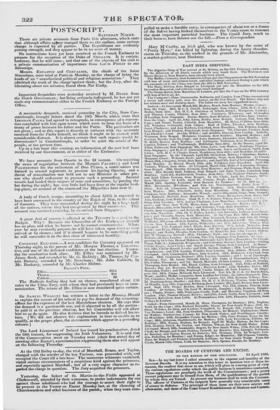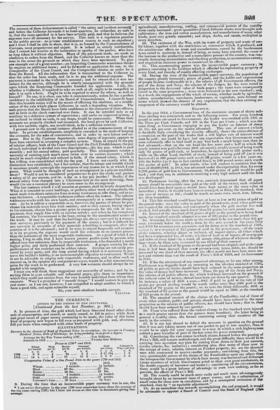THE BOARDS OF CUSTOMS AND EXCISE.
TO THE EDITOR OF THE SPECTATOR. 25 April 1803.
Sin-In my last-letter I called attention to the expense and inutility of the Revenue Boards. It is my intention in this letter to mention two or three in- stances, the readiest that occur to roe, which will place in a strong point of view the curious regulations under which the public business is sometimes conducted. Those regulations are peculiarly the work of the Commissioners ; and a pretty correct judgment may be formed from them, of the qualifications of the parties by whom they are framed. At present my business shall be with the Customs. The officers-of Customs at the outports have generally very. considerable sums of money to disburse. The principal of- these sums are thew own salaries and allowances, and those of the Coast Guard Establishment of Stations andCuttem. The account of these disbursements is =lied " the salary and incident accountl;''. I and before the Collector forwards it to head-quarters, he subscribes an oath to it, that the sums specified in it have been actually paid, and that he believes the I expenses were all necessary for the service. This oath is a regulation peculiar to the public service: no peivate establishment resorts to such an expedient ; I and I trust I shall be able to show, that it is, as framed by the Commissioners of Customs, most preposterous and unjust. It is indeed so utterly indefensible, that.I cannot but wonder at the inattention or apathy of the parties, who have so long taken it without objection. Many of the payments made, are made in obedience to orders from the Board, and the Collector knows no more than the man in the moon the grounds on which they have been sanctioned. To give one example out of a great number-an Inspecting Commander sometimes thinks lie requires an additional horse; and he forwards an application for one, to the Comptroller of the Coast Guard, and the Comptroller obtains an 'order for it from the Board. All the information that is transmitted to the Collector is, that the order has been made, and he is to pay the additional expense. The payment is included in the Collector's account ; and he swears that it was ne- cessary for the service, although he is utterly unacquainted with the grounds upon which the Inspecting Commander founded his application. I ask, Sir, whether a Collector, if required to take an oath at all, ought to be compelled to take it in such a form. Ought he to be required to swear for others, as well as himself? No one, it is clear, can take it conscientiously, unless he has a perfect confidence in the infallibility of the Board of Commissioners. I sincerely hope that this humble notice will be the mean's of effecting the abolition, or a modifi- cation of the rule which places Collectors in such a degrading situation. The oath proves that the Board have little confidence in the character of their officers, and as little in the check exercised over them. It an be intended only as an auxiliary to a defective system of supervision; and under an improved system, I am inclined to think an oath, in any shape, would be unnecessary. When their accounts are properly checked and examined; the bond given by each Collector, with two sureties, ought, one would think, to be a sufficient security. I proceed now to the second instance alluded to at the commencement of my letter. In private establishments, simplicity is consulted in the mode of keeping the accounts, for the sake of convenience, and in order to save labour and ex- pense. But in the Customs department, some degree of ingenuity appears to have been exercised in inventing a complex system. Thus, in regard to the pay of inferior officers, both of the Coast Guard and the Civil Establishment, the pay of each individual is divided into two descriptions,-his day pay, which is pia monthly ; and his annual salary, paid quarterly. This arrangement creates a necessity of entering each man's name twice over in various accounts ; which would be much simplified and reduced in bulk, if the annual salary, which is but trifling, was consolidated with the day pay. I know not exactly why the distinction was established ; but I feel certain, that the labour and trouble which it occasions greatly outweigh the importance of any reason for it, at which I can guess. What would be thought of such an arrangement in a private establish- ment? Would it not be considered preposterous to give the clerks and porters a salary of 5/. per annum, and 3s. a day as a day pay besides ? Really, if the annual salary were changed into a Christmas-box to the most deserving, there would (to use a common phrase) be more sense in the arrangement. The last instance which I will mention at present, shall be briefly despatched. 'When it is intended to erect buildings, or perform other work of magnitude, the usual mode is to obtain estimates from as many tradesmen as offer them, and to ac- cept the lowest. A respectable tradesman seldom offers the lowest. The inferior tradesman works with his own bands, and consequently at a somewhat cheaper rate. As he is seldom a responsible man, however, the parties of whom he pur- chases his materials trust him with caution; and as they cannot, having regard to his estimate, charge him a greater price to compensate for the risk of non- payment, they supply him with an inferior article; and when he has completed hie contract, the Government is the loser, owing to the unsubstantial nature of the work. It may be said that the buildings are always surveyed by a compe- tent surveyor, previously to the payment of the money; hut it is difficult for any surveyor to ascertain of what materials a building is composed, after the erection of it is far advanced ; and if he were to attend frequently and examine it in its prcgress, the expense would swell the estimate to an amount greater than the estimates of the most respectable tradesmen. As a proof of what I am stating, I beg to add, that I have known greater profits made by persons who offered very low estimates, than by respectable tradesmen, who demanded a much higher price, and fairly performed their contract. A proper security for the performance of the contract can be seldom taken. Sureties are not easily pro- cured by every party, and the long period.during.which it is necessary to pre- serve the builder's liabilty, is an insurmountable objection to contractors. Would
it not be advisable to employ only respectable tradesmen, and to allow such an amount as, in the opinion of a competent surveyor, would be a fair remunerating price for the work to be performed. A very low estimate should always be re- garded with suspicion.
I trust you will think these suggestions not unworthy of notice ; and by in- serting them in your valuable and influential paper, give them an importance which they could not receive from the very humble individual from whom they . emanate. Were I a preacher of "smooth timings" I would venture to give my real name : as I am not, however, I am compelled to adopt another, to which I have a good title, and again subscribe myself, Sir, your most obedient humble servant,
VERITAS.



















 Previous page
Previous page